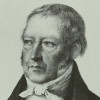“ In passing judgment on men who have accomplished something great and good, we often make use of the false distinction between inward and outward. ”
Georg Wilhelm Friedrich Hegel, Science of Logic (1816). copy citation
| Author | Georg Wilhelm Friedrich Hegel |
|---|---|
| Source | Science of Logic |
| Topic | distinction judgment |
| Date | 1816 |
| Language | English |
| Reference | |
| Note | Translated by William Wallace |
| Weblink | http://www.gutenberg.org/files/55108/55108-h/55108-h.htm |
Context
“But if a daub of a painter, or a poetaster, soothe themselves by the conceit that their head is full of high ideals, their consolation is a poor one; and if they insist on being judged not by their actual works but by their projects, we may safely reject their pretensions as unfounded and unmeaning. The converse case however also occurs. In passing judgment on men who have accomplished something great and good, we often make use of the false distinction between inward and outward. All that they have accomplished, we say, is outward merely; inwardly they were acting from some very different motive, such as a desire to gratify their vanity or other unworthy passion. This is the spirit of envy.”
source


